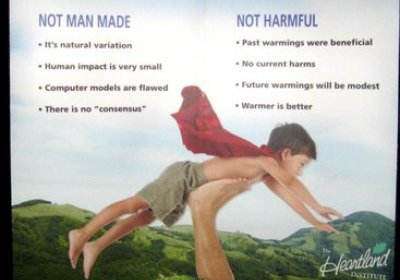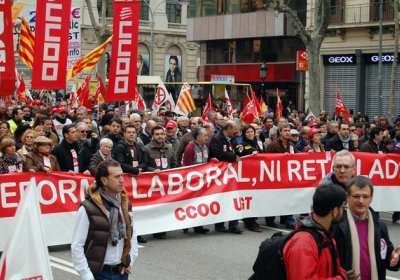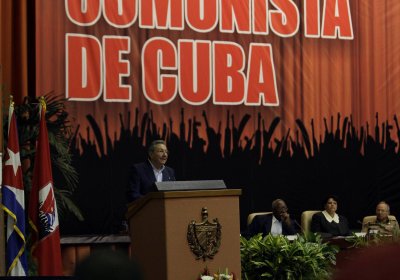Powerful US free-market think tank The Heartland Institute is reeling after leaked internal documents were posted on the Desmogblog website on February 14 showing the powerful corporate interests behind its well-known campaign against climate science.
Desmogblog said the leaked documents “expose the heart of the climate denial machine”, which “relies on huge corporate and foundation funding from US businesses”.
912
Will the Spanish economy benefit from Prime Minister Mariano Rajoy government’s anti-worker labour market reform?
The US response to the uprisings in the Arab world remains deeply hypocritical.
“It is time to stop the killing of Syrian citizens by their own government,” US President Barack Obama said at a February 24 meeting in Tunis of the representatives of 60 countries, led by the Western powers and their Arab allies.
The group cynically called itself the “Friends of Syria”.
Secretary of State Hillary Clinton took the opportunity to lash out at the US’s main global competitors, Russia and China.
Despite heavy police intimidation and media racism, the Nyoongar Tent Embassy at Matagarup, otherwise known as Heirisson Island in Perth, is still standing strong.
The Tent Embassy was founded by local Aboriginal people to voice dissent against a proposed deal with the state government that would include giving up native title rights.
The embassy is also about asserting Aboriginal sovereignty. Embassy participant Iva Hayward-Jackson told Green Left Weekly the embassy is about asserting Nyoongar sovereignty and protecting sacredness of Aboriginal culture.
German President Christian Wulff resigned on February 17 after prosecutors applied to have his presidential immunity stripped in a corruption scandal.
Wulff has been accused of having received kickbacks from businessmen, including a home loan of 500,000 euros (paid via an anonymous bank cheque) in 2008.
When German tabloid Bild threatened to publish the allegations, Wulff left voice messages on the editor's phone threatening "war".
Two decades after the demise of Soviet bureaucratic “socialism” and the onset of its “Special Period” crisis, Cuba is immersed in an ongoing debate on the future of its socialist project.
When Raul Castro became interim president in August 2006, he called for free and frank debate. He launched a series of nationwide consultations in the lead-up to the Sixth Congress of the Cuban Communist Party (PCC) in April last year.
Intersecting with these organised debates is a wider discussion in Cuba’s revolutionary press, academic journals and other institutional spaces.
If the uprisings of last year have proved anything, it is that progressive change is not out of reach, even in the most unlikely of circumstances. In the face of overwhelming odds, the Arab Spring has brought changes in the region that were unthinkable 18 months ago.
However, it is still common for people advocating radical change to be sneered at, regarded as naive fools or dangerous loonies.
But when you take an honest look at the state of the world today, it is those who think things should not change are the ones that start to look foolish or crazy.
Governments and commentators keen on promoting a war against Iran should be stridently opposed, not so much because of the threat to world peace, but because their reasons display a shocking lack of imagination.
The most common one is that Iran has "Weapons of Mass Destruction". How pathetic to pick the same excuse twice in a row. They should make it more interesting, by revealing evidence that Ahmadinejad has built a Terminator, or plans to fill the Strait of Hormuz with a giant Alka-Seltzer so the Persian Gulf fizzes over Kuwait.
Amnesty International has called on Israel to immediately release Palestinian prisoner Khader Adnan, who has been held since December without charge under Israel's infamous policy of “administrative detention”.
The call came after Adnan, near death, ended a 66-day hunger strike when Israel signed a deal on February 22 agreeing to release the 33-year-old father of two by April 17.
In the kabuki theatre of British parliamentary politics, great crimes do not happen and criminals go free.
It is theatre after all; the pirouettes matter, not actions taken at remove in distance and culture from their consequences. It is a secure arrangement guarded by cast and critics alike.
The farewell speech of one of the most artful, Tony Blair, had "a sense of moral conviction running through it", effused the television presenter Jon Snow, as if Blair's appeal to kabuki devotees was mystical. That he was a war criminal was irrelevant.
Len Cooper, the secretary of the Victorian Telecommunications Division of the Communications, Electrical and Plumbing Union, wrote to Victorian unions last August inviting them to take part in a discussion “aimed at leading to the formation of a campaign on the right to strike”.
The Victorian Trades Hall Council (VTHC) endorsed the campaign as a sub-committee of the hall on February 10. It committed to back a motion on the right to strike at the Australian Council of Trade Unions (ACTU) national congress, which takes place in Sydney in May.
The abridged statement below was initiated by the British Coalition of Resistance and signed by dozens of groups and individuals around the world ― including Australia's Socialist Alliance. See Coailiast of Resistancefor the list of signatories and to add your name.
* * *
- Previous page
- Page 2
- Next page









